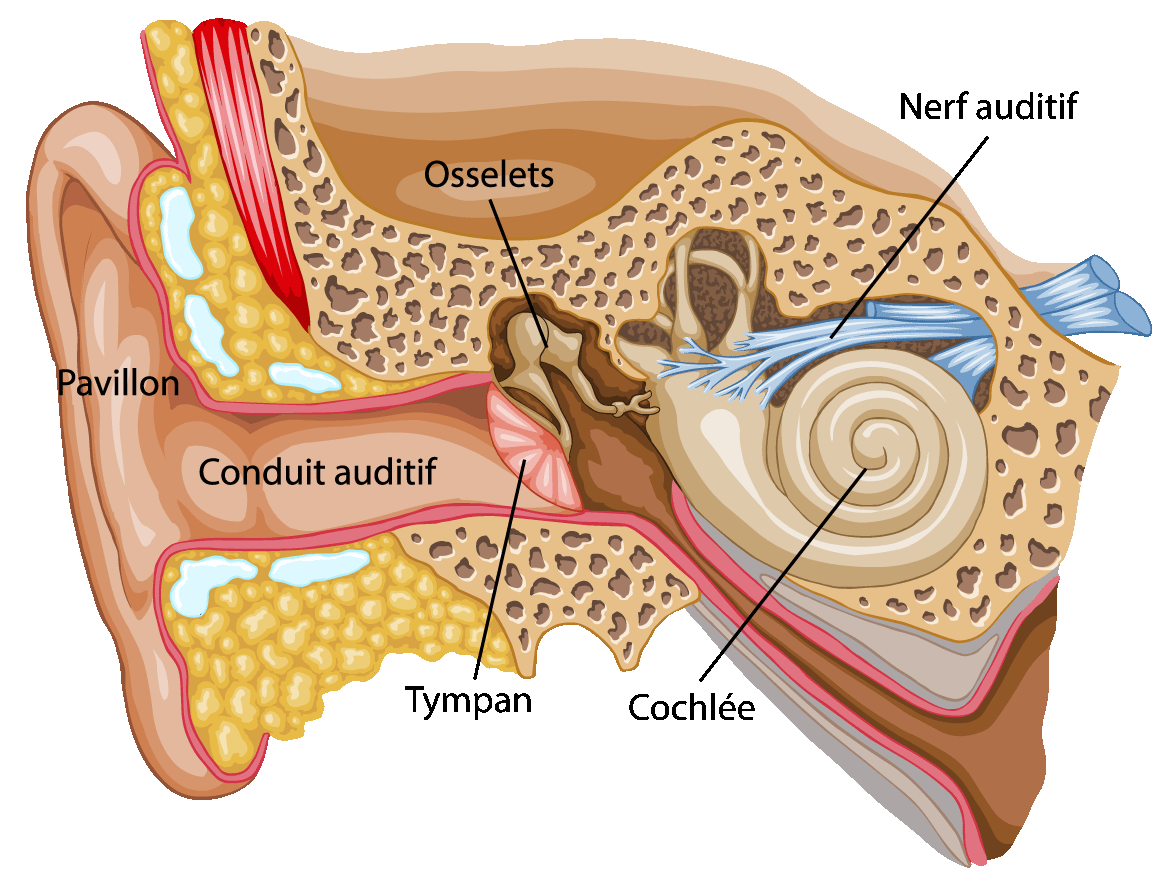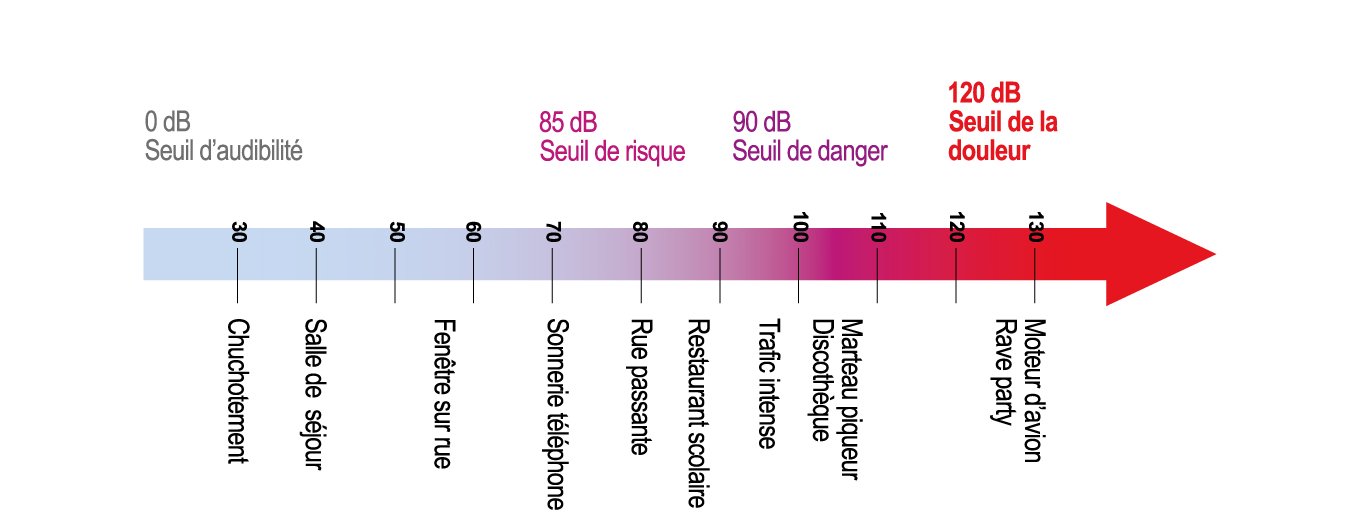How to protect and take care of your ears?
- Emilie
- News
- 0 Like
- 5355 Views
- 0 Feedback


How to protect and take care of your ears?
Whether it is in the street with the noise of cars, in a disco with the music in the boxes, in the garden with the noise of work in the neighbours' houses... our ears are constantly exposed to more or less annoying sounds. Should we worry about noise? What damage can it cause? How can we prevent these risks? Today we take a look at noise pollution.
What is noise?
Noise is a variation, a wave defined by a frequency expressed in hertz. It propagates in water as well as in the air.
How do we hear?
How do we hear sounds? We will explain how your ear works!
When a sound wave is emitted, our pinna picks up the vibration which passes through the ear canal to reach our eardrum. This vibration then arrives in the cavity in which there are three ossicles which will transmit the vibrations with a damping effect. It continues its way to the cochlea which stimulates hair cells. These cells, topped by rigid cilia, vibrate and trigger nerve impulses that reach the cerebral cortex and are recognized as the different sounds. We have 15,000 hair cells at birth.

Why protect your ears?
The danger threshold for the ear is around 85 Db. Many factors can make our auditory system fragile. Noise, water and change in atmospheric pressure are the main ones
Sound:
Our auditory system is constantly assaulted by decibels. The 15,000 hair cells in our ears are damaged or destroyed if they are exposed to too much noise. Once broken, these cells do not regenerate. It is therefore important to protect our ears and preserve the hair cells so as not to encounter hearing problems.
Water:
Salt and chlorine in the sea or swimming pool can cause hearing loss. Water also contains germs that can cause inflammation of the ear. It is therefore essential to protect them when you go in the water to prevent your ears from becoming fragile.
Pressure changes:
When you fly or even sometimes take the train, you feel a sudden change in air pressure. Your ears start to hurt because the pressure in front of and behind your eardrums is no longer the same. In order to relieve your ears and to preserve them, it is recommended to wear earplugs to equalize the pressure in your ears.
What are the symptoms of noise overexposure?
Are your ears ringing or buzzing? Are you hypersensitive to noise? Do you feel pain in your ears? Do you have a fluffy ear sensation? If any of these symptoms occur, you have probably been exposed to noise. Fortunately, this discomfort is short-lived... But if you continue to expose yourself to loud sounds for a long time, your hearing capital will decrease. This will lead to lasting problems and premature hearing loss. If these symptoms persist after a quiet night, consult an ENT specialist. Quick treatment will be prescribed to avoid or reduce irreversible effects such as tinnitus or hearing loss.
Overexposure to noise can also cause side effects such as reduced long-term memory, sleep problems and stress.
Unfortunately, we only worry about our ears when we start to hear less well. However, this is often too late... The damage has already been done.
Did you know?
The ear of a foetus can be damaged by excessive sound during pregnancy.
Decibels in our daily lives:

How can you protect your ears and your hearing?
Don't wait until it's too late to start taking care of your ears. Horizane Health gives you some tips on how to best protect your ears.
Use earplugs:
It is important to wear earplugs in noisy environments. Music in a disco, in a concert, the chainsaw or the lawnmower... All these noises that make you speak loudly so that the person next to you can hear you are dangerous. The earplug must be used when the noises are dangerous or painful for your ears (snoring, public transport...). Whether it's noise, water or changes in air pressure, it's important to wear hearing protection.
- Reduce the volume:
According to the World Health Organization, at least 1.1 billion adolescents and young adults worldwide are at risk of hearing loss due to unsafe and inappropriate use of listening devices. If you are listening to music or watching a movie with headphones or earphones, make sure you do not turn the volume up. It is recommended that you follow the 60/60 rule. This means that you should not listen for more than 60 minutes in headphones at a volume that does not exceed 60% of the maximum volume. On the other hand, if you play music at home on a speaker, make sure you set the music so that you can hear a conversation without shouting.
- Give your ears a rest:
Don't stay exposed to noise for too long. Your ears need silence, so try to take breaks for a few minutes to give them a rest. Did you know that to recover from a night at a disco or concert your ear needs an average of 16 hours of quiet?
- Consult an ENT specialist:
Hearing loss is generally progressive. That is why it is advisable to make an appointment with an ENT every year. He or she will be able to detect the first signs of hearing loss or other problems and treat them quickly.
Our solution:
.jpg)
Hearing loss is a daily burden. It can lead to other health problems such as depression, dementia or cardiovascular disease. In order to prevent these risks, we have developed earplugs for every occasion.
Special DIY earplugs, earplugs for sleeping peacefully, earplugs for swimming quietly in the sea or pool, earplugs specifically designed for children's small ducts, for noisy evenings or even for flying... We provide the solution to protect your ears!
In foam, silicone or thermoplastic with double filter, you will find the one you need! Our Plic Audio earplugs will significantly reduce the intensity of noise and will allow you to keep a quality hearing with a great comfort of use.

Feedback (0)